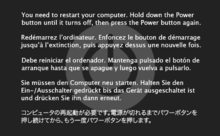This is an old revision of this page, as edited by Kephir (talk | contribs) at 13:38, 14 August 2014 (→External links: change template to one with broader scope). The present address (URL) is a permanent link to this revision, which may differ significantly from the current revision.
Revision as of 13:38, 14 August 2014 by Kephir (talk | contribs) (→External links: change template to one with broader scope)(diff) ← Previous revision | Latest revision (diff) | Newer revision → (diff)| This article has multiple issues. Please help improve it or discuss these issues on the talk page. (Learn how and when to remove these messages)
No issues specified. Please specify issues, or remove this template. (Learn how and when to remove this message) |


The Black Screen of Death (KSoD or BlSoD) is the black error screen displayed by some operating systems after encountering a critical system error which can cause the system to shut down.
The Windows black screen of death
Windows 3.x

In Windows 3.x the black screen of death is the behaviour that occurred when a DOS-based application failed to execute properly. It was often known to occur in connection with attempting certain operations while networking drivers were resident in memory. (Commonly, but not exclusively, it was seen while the Novell NetWare client for DOS, NETX, was loaded.)
According to Wallace McClure of ASP.net, the phrase was originally coined in mid-1991 by Ed Brown, a technician with The Coca-Cola Company's IT department in Atlanta, GA. He reports that the company was rolling out Windows 3.0 within the Global Marketing group and when the users would attempt to run WordPerfect, they would randomly receive a BlSOD.
Later versions of Windows
Windows 95, Windows 98, Windows 2000, Windows ME, Windows XP, Windows Vista, and Windows 7 also display a Black Screen of Death when the operating system cannot boot. This is usually due to a missing file. This also happens when the user enables file compression on all files and the operating system compresses. Often the user must reinstall Windows, if the missing file is critical to the boot process. However, more often than not the boot screen will inform the user of the missing file. If the operating system is compressed, it will not be able to boot, even into safe mode.
In late 2009 several new reports of the Black Screen of Death in Windows XP, Windows Vista, and Windows 7 emerged. At first several claims pointed at a Windows Update. It was later recanted by Prevx as an erroneous report. Microsoft reported that no security update was causing the issue, and it may be tied to malicious software, or malware. In other cases, the black screen of death was replaced with the Blue Screen of Death. The Black Screen of Death may also be caused by certain components of a computer becoming too hot (overheating).
Early builds of Windows 8 feature a black screen of death, in place of the traditional blue screen, that appears to indicate a Stop error. The Windows 8 black screen of death is simplified compared to the previous blue screen, omitting instructions that the user is recommended to take.
In game consoles

A black screen can be encountered on numerous other computer systems such as the Nintendo GameCube if the game disc is dirty or damaged or if there is an internal problem with the system such as an illegal operation. The message that displays on-screen is "An error has occurred. Turn the power off and check the Nintendo GameCube instruction booklet for further instructions."
See also
References
- Although the short form BSoD was once used to describe the Black Screen of Death, nowadays the said short form is used to describe the much more common Blue Screen of Death (for Windows) so as to avoid confusion between the Blue and Black Screens of Death.
- Wallace B. McClure (2004-02-24). "Origin of BSOD". Retrieved 2001-07-10.
- "How to fix MBR (remove multiple installations) and install Windows 7".
- "Black Screen on Boot". Support.microsoft.com. 2007-01-19. Retrieved 2012-01-08.
- "Computer stops responding with a black screen when you start Windows XP". Support.microsoft.com. 2011-02-03. Retrieved 2012-01-08.
- Erasmus, Jacques (2009-11-30). "Windows Black Screen Root Cause". Prevx.com. Retrieved 2012-01-08.
- Morris, Mel. "Windows Black Screen recap". Prevx.com. Retrieved 2012-01-08.
- "'Black screen of death' for some Windows users - Technology & science - Security - msnbc.com". MSNBC. 1/8/2012. Retrieved 2012-01-08.
{{cite web}}: Check date values in:|date=(help) - MSRCTeam (2009-12-01). "Reports of Issues with November Security Updates - MSRC - Site Home - TechNet Blogs". Blogs.technet.com. Retrieved 2012-01-08.
- Tom Warren (24 April 2011). "Microsoft switches to Black Screen Of Death (BSoD) for Windows 8". WinRumors.
- "Nintendo GameCube Instruction Booklet" (PDF). Retrieved 2012-01-08.
External links
| Error messages | |
|---|---|
| System failure | |
| Application failure | |
| Device and data errors | |
| Other | |
| Lists | |
| Related | |